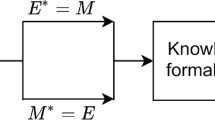Abstract
The concern of this paper is to elaborate a basic understanding of semiconcepts and protoconcepts as notions of Formal Concept Analysis. First, semiconcepts and protoconcepts are motivated by their use for effectively describing formal concepts. It is shown that one can naturally operate with those units of description, namely with operations which constitute algebras of semiconcepts and algebras of protoconcepts as so-called double Boolean algebras. The main results of this paper are the two basic theorems which characterize semiconcept resp. protoconcept algebras as pure resp. fully contextual double Boolean algebras whose related Boolean algebras are complete and atomic. Those theorems may, for instance, be applied to check whether line diagram representations of semiconcept and protoconcept algebras are correct.
Preview
Unable to display preview. Download preview PDF.
Similar content being viewed by others
References
Dau, F., Klinger, J.: From Formal Concept Analysis to Contextual Logic. In: Ganter, B., Stumme, G., Wille, R. (eds.) Formal Concept Analysis. LNCS (LNAI), vol. 3626, pp. 81–100. Springer, Heidelberg (2005)
Dörflein, S.: Coherence networks of concept lattices, Dissertation, TU Darmstadt. Shaker Verlag, Aachen (1999)
Eklund, P., Groh, B., Stumme, G., Wille, R.: A contextual-logic extension of TOSCANA. In: Ganter, B., Mineau, G.W. (eds.) ICCS 2000. LNCS, vol. 1867, pp. 453–467. Springer, Heidelberg (2000)
Fodor, J.A.: Concepts: where cognitive science went wrong. Oxford University Press, New York (1998)
Ganter, B., Wille, R.: Formal Concept Analysis: mathematical foundations. In: Springer, Heidelberg (1999) German version: Springer, Heidelberg (1996)
Ganter, B., Wille, R.: Contextual Attribute Logic. In: Tepfenhart, W.M. (ed.) ICCS 1999. LNCS, vol. 1640, pp. 377–388. Springer, Heidelberg (1999)
Hartung, G.: Topological representation of lattices via formal concept analysis. Algebra Universalis 29, 273–299 (1992)
Herrmann, C., Luksch, P., Skorsky, M., Wille, R.: Algebras of semiconcepts and double Boolean algebras. In: Contributions to General Algebra, vol. 13, pp. 175–188. Verlag Johannes Heyn, Klagenfurt (2001)
Klinger, J.: Simple semiconcept graphs: a Boolean approach. In: Delugach, H.S., Stumme, G. (eds.) ICCS 2001. LNCS (LNAI), vol. 2120, pp. 101–114. Springer, Heidelberg (2001)
Klinger, J.: Semiconcept graphs with variables. In: Priss, U., Corbett, D.R., Angelova, G. (eds.) ICCS 2002. LNCS (LNAI), vol. 2393, pp. 369–381. Springer, Heidelberg (2002)
Klinger, J., Vormbrock, B.: Contextual Boolean Logic: how did it develop? In: Ganter, B., de Moor, A. (eds.) Using conceptual structures. Contributions to ICCS 2003, pp. 143–156. Shaker Verlag, Aachen (2003)
Lakoff, G.: Cognitive models and prototype theory. In: Neisser, U. (ed.) Concepts and conceptual developments: ecological and intellectual factors in categorization, pp. 63–100. Cambridge University Press, Cambridge (1987)
Luksch, P., Wille, R.: A mathematical model for conceptual knowledge systems. In: Bock, H.H., Ihm, P. (eds.) Classification, data analysis, and knowledge organisation, pp. 156–162. Springer, Heidelberg (1991)
Schröder, E.: Algebra der Logik. Bd.1. Leipzig 1890. Chelsea Publ. Comp., New York (1966)
Seiler, T.B.: Begreifen und Verstehen. Ein Buch über Begriffe und Bedeutungen. Verlag Allgemeine Wissenschaft, Mühltal (2001)
Stahl, J., Wille, R.: Preconcepts and set representations of contexts. In: Gaul, W., Schader, M. (eds.) Classification as a tool of research, pp. 431–438. North- Holland, Amsterdam (1986)
Vormbrock, B.: Congruence relations on double Boolean algebras. Algebra Universalis (submitted)
Wille, R.: Restructuring lattice theory: an approach based on hierarchies of concepts. In: Rival, I. (ed.) Ordered sets, pp. 445–470. Reidel, Dordrecht (1982)
Wille, R.: Plädoyer für eine philosophische Grundlegung der Begrifflichen Wissensverarbeitung. In: Wille, R., Zickwolff, M. (eds.) Begriffliche Wissensverarbeitung: Grundfragen und Aufgaben, pp. 11–25. B.I.-Wissenschaftsverlag, Mannheim (1994)
Wille, R.: The basic theorem of Triadic Concept Analysis. Order 12, 149–158 (1995)
Wille, R.: Boolean Concept Logic. In: Ganter, B., Mineau, G.W. (eds.) ICCS 2000. LNCS, vol. 1867, pp. 317–331. Springer, Heidelberg (2000)
Wille, R.: Contextual Logic summary. In: Stumme, G. (ed.) Working with Conceptual Structures. Contributions to ICCS 2000, pp. 265–276. Shaker, Aachen (2000)
Wille, R.: Boolean Judgment Logic. In: Delugach, H.S., Stumme, G. (eds.) ICCS 2001. LNCS (LNAI), vol. 2120, pp. 115–128. Springer, Heidelberg (2001)
Wille, R.: Existential concept graphs of power context families. In: Priss, U., Corbett, D.R., Angelova, G. (eds.) ICCS 2002. LNCS (LNAI), vol. 2393, pp. 382–395. Springer, Heidelberg (2002)
Wille, R.: The contextual-logic structure of distinctive judgments. In: Angelova, G., Priss, U., Corbett, D. (eds.) Foundations and applications of conceptual structures. Contributions to ICCS 2002, pp. 92–101. Bulgarian Academy of Sciences, Sofia (2002)
Wille, R.: Conceptual content as information - basics for Conceptual Judgment Logic. In: Ganter, B., de Moor, A., Lex, W. (eds.) ICCS 2003. LNCS, vol. 2746, pp. 1–5. Springer, Heidelberg (2003)
Wille, R.: Formal Concept Analysis as mathematical theory of concepts and concept hierarchies. In: Ganter, B., Stumme, G., Wille, R. (eds.) Formal Concept Analysis. LNCS (LNAI), vol. 3626, pp. 1–33. Springer, Heidelberg (2005)
Wille, R.: Preconcept algebras and generalized double Boolean algebras. In: Eklund, P. (ed.) ICFCA 2004. LNCS (LNAI), vol. 2961, pp. 1–13. Springer, Heidelberg (2004)
Wille, U.: Characterization of ordered bilinear contexts. Journal of Geometry 64, 167–207 (1999)
Author information
Authors and Affiliations
Editor information
Editors and Affiliations
Rights and permissions
Copyright information
© 2005 Springer-Verlag Berlin Heidelberg
About this chapter
Cite this chapter
Vormbrock, B., Wille, R. (2005). Semiconcept and Protoconcept Algebras: The Basic Theorems. In: Ganter, B., Stumme, G., Wille, R. (eds) Formal Concept Analysis. Lecture Notes in Computer Science(), vol 3626. Springer, Berlin, Heidelberg. https://doi.org/10.1007/11528784_2
Download citation
DOI: https://doi.org/10.1007/11528784_2
Publisher Name: Springer, Berlin, Heidelberg
Print ISBN: 978-3-540-27891-7
Online ISBN: 978-3-540-31881-1
eBook Packages: Computer ScienceComputer Science (R0)




